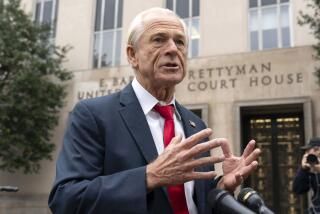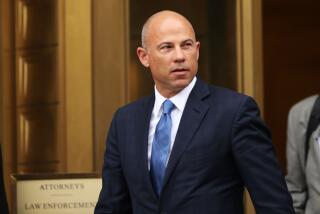Guilty Verdict for Associate of Abramoff
- Share via
WASHINGTON — In the first trial arising from the Jack Abramoff influence-peddling scandal, a federal jury on Tuesday found a former Bush administration official guilty of lying and concealing his ties to the disgraced Republican lobbyist.
The case against David H. Safavian, once the government’s chief procurement officer, turned on a lavish golf outing to Scotland. His conviction was a milestone for the Justice Department, which is continuing to pursue figures linked to Abramoff. The verdict adds momentum to that probe and is apt to put pressure on Safavian to cooperate with investigators to gain leniency when he is sentenced.
Abramoff pleaded guilty in January to conspiring to corrupt public officials and to steal millions from Indian tribes he represented; he has agreed to cooperate in the ongoing investigation of his activities. Abramoff did not testify at Safavian’s trial, although prosecutors introduced dozens of e-mails to show how he used his friendship with Safavian to learn more about government properties for sale.
Safavian was found guilty on three counts of lying or making false statements and one count of obstructing justice. Each count carries a maximum penalty of five years in prison and a $250,000 fine. U.S. District Judge Paul L. Friedman set sentencing for Oct. 12.
“The message of this verdict is clear: In answering questions posed by Congress and by federal agencies, public officials have the same obligation as does the public for which they serve -- to tell the truth. No one is above the law,” Alice Fisher, chief of the Justice Department’s criminal division, said in a prepared statement.
The verdict comes amid the investigation into whether Abramoff illegally traded campaign contributions and other favors to aid his lobbying clients. Federal agents are focusing on a number of Congress members, including Rep. Bob Ney (R-Ohio), whose former chief of staff was the key government witness against Safavian.
Three other former Abramoff associates have pleaded guilty to crimes related to the scandal.
A lawyer for Safavian said her client had tried to play by the rules but had been swept up in a broader government corruption crackdown.
“The task force will say how this was a great day in the war on corruption,” Barbara van Gelder said after the verdict. “I find they made a mountain out of a molehill, and now they’re going to plant the flag on top of the molehill.”
Legal experts said the verdict would strengthen the government’s hand in dealing with others under investigation, and show that the government was serious about pursuing even lesser players caught in the Abramoff web.
“The conviction likely will encourage other witnesses -- who until now have been unwilling to cooperate -- to get off the fence and make a deal,” said Greg Wallance, a former federal prosecutor in Brooklyn who was part of the team that prosecuted members of Congress in the so-called ABSCAM investigation in the 1970s and 1980s.
Democrats, eager to make corruption in Washington an issue at the polls in November, also said the conviction was significant.
The verdict “is another sign that the grip of the Republican culture of corruption and abuses of power in Washington is loosening, but it’s just the tip of the iceberg,” Democratic National Committee Chairman Howard Dean said.
Safavian befriended Abramoff at a Washington lobbying firm in the mid-1990s, when Abramoff was just beginning his rise to power in the capital. Safavian later struck out on his own to form a lobbying firm with conservative activist Grover Norquist. Safavian also worked as a congressional aide.
In 2002, he was named chief of staff at the General Services Administration, the powerful agency that manages billions in federal real estate. President Bush later named him the top procurement official at the Office of Management and Budget. He resigned that post last fall just before he was arrested and charged.
Prosecutors said Safavian never stopped working with Abramoff, even after he was employed by a federal agency. Soon after arriving at GSA, he began exchanging e-mails with Abramoff about two pieces of GSA property that the lobbyist was interested in developing in the Washington area.
The case boiled down to whether Safavian had misled GSA ethics officers and other investigators about his relationship with Abramoff and the circumstances of a lavish golf trip to Scotland that Abramoff was organizing at the time. Safavian went on the August 2002 trip, reimbursing Abramoff $3,100 to cover his share of the costs.
But prosecutors said the sum was a small fraction of the total cost, which included private jet service, luxury hotel accommodations and $400 rounds of golf at the famed Old Course at St. Andrews.
Safavian had requested an opinion from the GSA ethics office about whether he was permitted under agency conflict-of-interest rules to go on the trip. The office approved the trip after Safavian assured officials in an e-mail that Abramoff had “no business before G.S.A.”
Prosecutors said the statement was a lie. Using e-mail traffic, they showed that, just weeks before the trip, Safavian was advising Abramoff on how to acquire GSA property in Maryland for a Jewish academy that the lobbyist had founded. Safavian also offered Abramoff tips on being considered for a GSA contract to redevelop the Old Post Office building on Pennsylvania Avenue near the White House.
Abramoff didn’t acquire either property.
In addition, the five-count indictment charged Safavian with lying and concealing information from the GSA inspector general -- who had been tipped off to the trip by an anonymous call to the agency hot line. Safavian also was charged with lying to the staff of a Senate committee that was investigating Abramoff. He was acquitted of a charge of obstructing the committee’s investigation.
Safavian’s case was hurt by the testimony of a former congressional staffer, GSA officials -- and his own words.
A star witness was Neil Volz, who had gone to work for Abramoff after serving as chief of staff to Ney. He testified that Safavian and Ney were seen as “champions” who could always be counted on to back causes the lobbyists touted. Both Volz -- who testified as part of a deal with prosecutors last month in which he pleaded guilty to corruption charges -- and Ney were part of the golf trip to Scotland.
GSA and Senate investigators testified that they were kept in the dark about the advice Safavian gave Abramoff, and said the information could have altered their decision to clear the trip.
And Safavian, testifying in his own defense, said that the $3,100 he paid for the golf trip was based on an estimate provided by Abramoff, and that he had no reason to doubt it despite lavish accommodations. He said under cross-examination that he believed the cost of a round of golf at St. Andrews was “comparable” to the $135 he paid to play golf at a good course in the Maryland suburbs. The government estimated that the true cost of his share was more than five times the amount he paid.
“Mr. Safavian tried to serve two masters,” Justice Department lawyer Nathaniel Edmonds told the jury last week as the government wrapped up its case. “He was appointed by the president to serve the people of the United States. But he chose to serve Jack Abramoff.”
More to Read
Sign up for Essential California
The most important California stories and recommendations in your inbox every morning.
You may occasionally receive promotional content from the Los Angeles Times.










